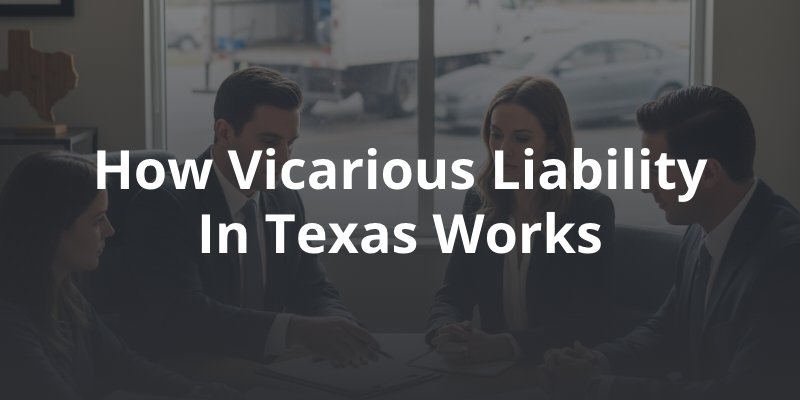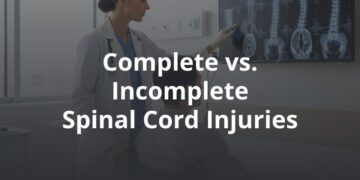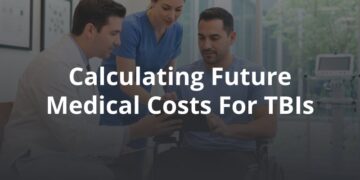
If you get hurt in an accident that should have been prevented by another person or party, you may be able to hold that party liable, or legally and financially responsible, for your injuries. Before you pursue a settlement, however, it is important to consider how the doctrine of vicarious liability may affect your claim.
Under this law, you may be able to hold a third party responsible for your accident and injuries, even if they were not directly involved in the accident. Exploring this law with an Austin personal injury attorney can allow you to maximize your financial recovery by identifying all potential sources of compensation.
What Is the Legal Doctrine of Vicarious Liability?
Vicarious liability is a legal principle that can be applied in a personal injury case to hold a third party responsible for the conduct of another person or party. Certain relationships trigger the doctrine of vicarious liability in Texas, such as an employer-employee relationship.
Vicarious liability stems from the doctrine of respondeat superior, which translates to “let the master answer.” It can allow a third party to be held responsible for an accident and injury in Texas, even if the entity was not directly at fault.
When Does Vicarious Liability Apply in Texas?
| Relationship Type | Example Scenario | Liability Notes |
|---|---|---|
| Employer – Employee | Employee causes a car accident while on the job | Employer may be held liable under respondeat superior if employee acted within scope of employment |
| Parent – Minor Child | Child damages property or causes an accident | Parent may be liable if negligent in supervision or child acts willfully |
| Trucking Company – Driver | Truck driver causes an accident during delivery | Company can be held responsible for driver negligence while on duty |
| Hospital – Independent Contractor | Contracted medical staff causes harm | Hospital may be liable if staff acts within scope of assigned duties |
| Business Partners | Partner causes injury while conducting business | Other partners can be held responsible for negligent acts |
| Vehicle Owner – Driver | Owner loans vehicle to reckless or unlicensed driver | Owner may be liable if they knowingly allowed unsafe use |
| Dram Shop – Patron | Bar serves alcohol to obviously intoxicated person who causes an accident | Bar can be liable under dram shop laws |
| Government Entity – Employee/Agent | On-duty agent causes accident | Entity may be vicariously liable, often subject to stricter filing deadlines |
Considering the possibility of vicarious liability can be important to your injury claim, as it can grant you access to greater insurance coverage than holding the at-fault party independently liable. Employers and businesses in Texas typically have commercial insurance, for example, with higher policy limits than individual insurance plans.
The vicarious liability doctrine is most commonly applied in personal injury cases brought against employers in Texas for employee negligence, or the failure to act with proper care based on the circumstances. In Texas, an employer can be held vicariously liable for the careless, reckless and wrongful acts of on-duty employees.
To prove a vicarious liability claim in Texas, you or your lawyer must establish that a respondeat superior relationship existed between the defendant and the at-fault party, such as employer-to-employee. The individual must have been acting within the course or scope of his or her employment at the time of the negligent act for the employer to be held responsible.
When Is an Employer Exempt From Vicarious Liability?
An employer in Texas may be protected from vicarious liability if the at-fault party is an independent contractor and not an employee of the company. If the individual was off-duty or acting outside the scope of his or her employment, this can also protect the employer from receiving the blame. Finally, if the employee’s conduct was reckless, criminal or unauthorized, this could prevent the vicarious liability doctrine from being applied.
Other Examples of Vicarious Liability in Texas Personal Injury Cases
While employers in Texas are the subjects of vicarious liability claims most frequently, they are not the only possibility. Several other relationships could also give you the opportunity to file a claim against a third party after an accident in Texas, including:
- Parents and minor children (when a minor has caused willful and malicious property damage or the parent was negligent in supervising)
- A trucking company and its truck drivers
- Hospitals and independently contracted medical staff
- An agent or representative who has been authorized to act on behalf of another person
- Business partners (can be held liable for each other’s actions)
- A corporation and its franchise
- The owner of a motor vehicle, if it was knowingly loaned to an incompetent, unlicensed or dangerous driver
- Government entities and their on-duty agents
- Dram shops (alcohol vendors) and underage or obviously intoxicated individuals
You should always discuss the possibility of vicarious liability in your personal injury claim with an attorney. There may be parties you can hold liable outside of the individuals who were present at the scene. Identifying all of these parties can grant you access to the greatest amount of insurance coverage.
How to Prove Vicarious Liability
If you wish to prove a vicarious liability claim against an employer or another third party in Texas, you must show that the party you are naming is legally responsible for the actions of someone directly involved in your accident. You must demonstrate that the person who caused your injury (known as the tortfeasor) had a qualifying relationship with the third party (defendant).
Establishing a vicariously liable relationship takes proof that the tortfeasor’s negligent or wrongful acts occurred while he or she was on duty, such as employment records or payroll documents. You must also prove negligence, demonstrating that the tortfeasor owed you a duty of care, breached or violated this duty, and caused your accident and injury.
The evidence you can gather to support your vicarious liability claim in Texas may include a police report, photographs and video footage, eyewitness statements, and expert testimony. An experienced attorney can investigate your accident to search for evidence that can be used to establish the doctrine of respondeat superior on your behalf.

150+ years experience500+ 5 star reviews24/7 assistance
Top Personal Injury & Accident Lawyers
Call an Austin personal injury lawyer at FVF Law Firm – Injury & Wrongful Death Lawyers for a free consultation at (512) 910-7536.
What Is the Statute of Limitations?
If you are bringing a personal injury claim against an individual or entity in Texas, you have no more than two years from the date of your accident (or of injury discovery, whichever is later) to take legal action under Texas Civil Practice and Remedies Code § 16.003.
You may have much less time, however, if you wish to hold a government entity vicariously liable. These claims must be filed within six months or less, depending on the type of government named in your claim.
How a Texas Personal Injury Lawyer Can Help
An attorney in Texas can help you navigate a complex claim that involves the doctrine of vicarious liability in Texas. At FVF Law Firm – Injury & Wrongful Death Lawyers, we will use our more than 100 years of combined legal experience to build a compelling case against one or multiple parties on your behalf.
If you have grounds to hold an employer, parent, dram shop or another third party vicariously liable for the actions of another person, we will guide you through this type of claim from start to settlement.
Our team can identify third parties, establish the necessary relationship for vicarious liability, gather critical evidence, and handle conversations with claims adjusters to negotiate for maximum compensation for you and your family. If your vicarious liability case requires us to bring a third party to trial in Texas, you can count on us to use aggressive trial techniques to optimize case results.
Learn more about how we can build a strong, strategic claim on your behalf during a no-cost case review at our local law office. Contact us today.







